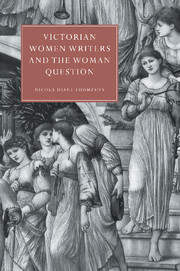Book contents
- Frontmatter
- Contents
- List of illustrations
- Notes on contributors
- 1 Responding to the woman questions: rereading noncanonical Victorian women novelists
- 2 Marriage and the antifeminist woman novelist
- 3 Breaking apart: the early Victorian divorce novel
- 4 Phantasies of matriarchy in Victorian children's literature
- 5 Gendered observations: Harriet Martineau and the woman question
- 6 Maximizing Oliphant: begging the question and the politics of satire
- 7 Literary women of the 1850s and Charlotte Mary Yonge's
- 8 Portraits of the artist as a young woman: representations of the female artist in the New Woman fiction of the 1890s
- 9 Lady in green with novel: the gendered economics of the visual arts and mid-Victorian women's writing
- 10 Ouida and the other New Woman
- 11 Organizing women: New Woman writers, New Woman readers, and suffrage feminism
- 12 Shot out of the canon: Mary Ward and the claims of conflicting feminism
- 13 E. Nesbit and the woman question
- 14 “An ‘old-fashioned’ young woman”: Marie Corelli and the New Woman
- CAMBRIDGE STUDIES IN NINETEENTH-CENTURY LITERATURE AND CULTURE
14 - “An ‘old-fashioned’ young woman”: Marie Corelli and the New Woman
Published online by Cambridge University Press: 01 March 2010
- Frontmatter
- Contents
- List of illustrations
- Notes on contributors
- 1 Responding to the woman questions: rereading noncanonical Victorian women novelists
- 2 Marriage and the antifeminist woman novelist
- 3 Breaking apart: the early Victorian divorce novel
- 4 Phantasies of matriarchy in Victorian children's literature
- 5 Gendered observations: Harriet Martineau and the woman question
- 6 Maximizing Oliphant: begging the question and the politics of satire
- 7 Literary women of the 1850s and Charlotte Mary Yonge's
- 8 Portraits of the artist as a young woman: representations of the female artist in the New Woman fiction of the 1890s
- 9 Lady in green with novel: the gendered economics of the visual arts and mid-Victorian women's writing
- 10 Ouida and the other New Woman
- 11 Organizing women: New Woman writers, New Woman readers, and suffrage feminism
- 12 Shot out of the canon: Mary Ward and the claims of conflicting feminism
- 13 E. Nesbit and the woman question
- 14 “An ‘old-fashioned’ young woman”: Marie Corelli and the New Woman
- CAMBRIDGE STUDIES IN NINETEENTH-CENTURY LITERATURE AND CULTURE
Summary
Although she wrote at a time when feminist agitation was at its peak, Marie Corelli (1855–1924) was not exactly on the vanguard of feminism's first wave. She opposed women's suffrage and detested the New Woman, and she was able to speak directly to a discontented audience who felt alienated from the tenets of emerging feminists and practitioners of the New Fiction. At the same time, Corelli believed in the intellectual equality of women, supported women's economic independence as an indispensable right, and loudly opposed sexism within the male literary establishment. This apparent contradiction has invited recent examinations of Marie Corelli as a cultural phenomenon. Her conspicuous place in late-Victorian society has become a way of entering discussions of feminism, decadence, class ideology, and Victorian and early modern literary culture.
And she is conspicuous: in 1886, Corelli began an unparalleled publication record. At the turn of the century, sales of her novels averaged 175,000 copies, and Temporal Power (1902) achieved a first day record of 120,000. Her fall in popularity was sudden and total after World War I, and Corelli's reputation today as a low-status author of “bestsellers” has hardly been disputed, despite the fact that her success had a lasting impact both on the publishing industry and on generations of readers, whofound her narrative energy and moral assertiveness irresistible.
Several critics have worked within a feminist framework under the assumption that Corelli's huge popularity and splintered feminism may provide us with information about women and culture at the turn of the century. Although extremely important for nineteenth-century studies, the historical and demographic focus of these works tend to dispense with any sustained or formal reading of Corelli's novels.
- Type
- Chapter
- Information
- Victorian Women Writers and the Woman Question , pp. 241 - 259Publisher: Cambridge University PressPrint publication year: 1999
- 1
- Cited by

